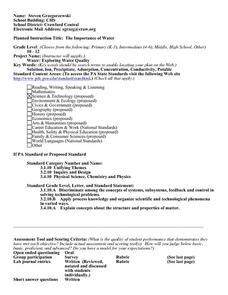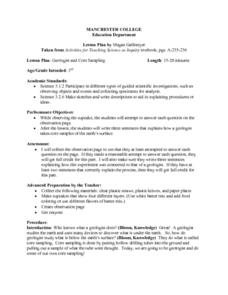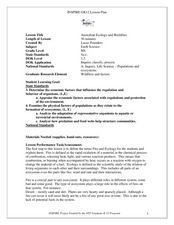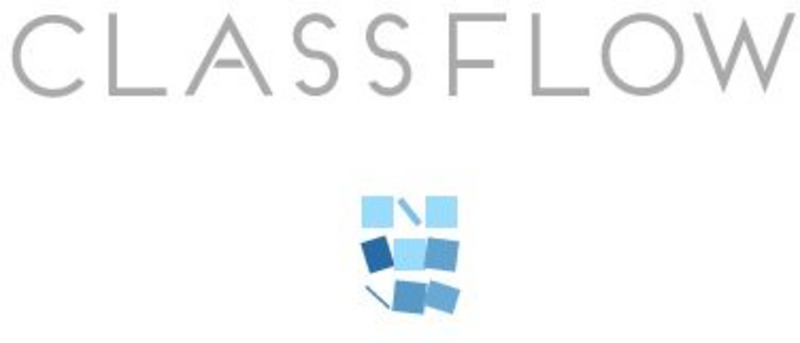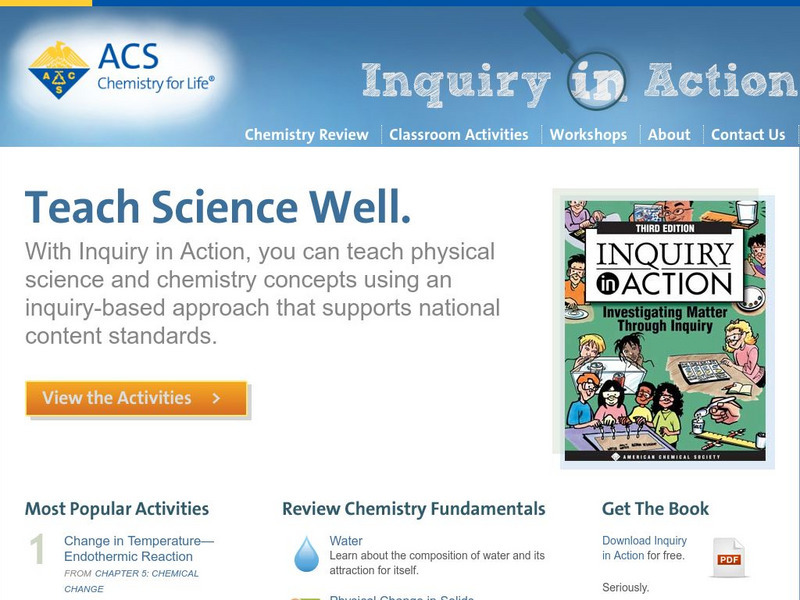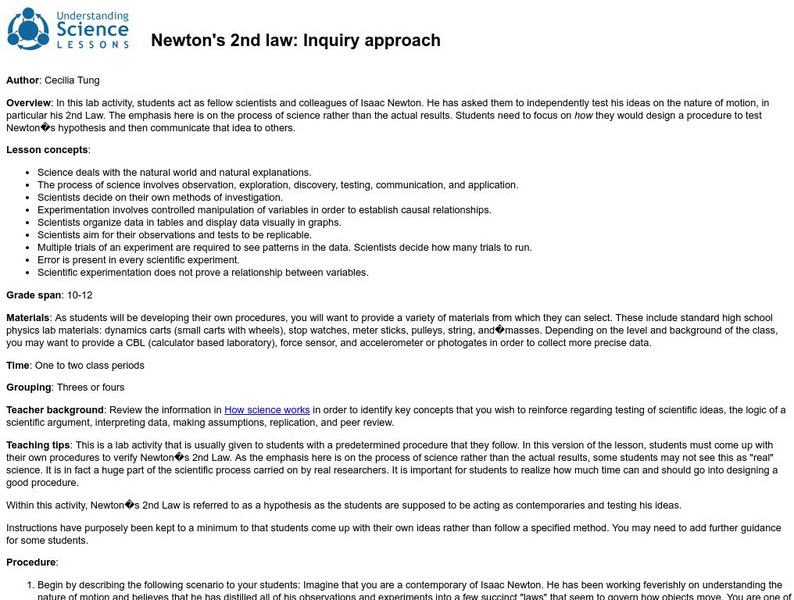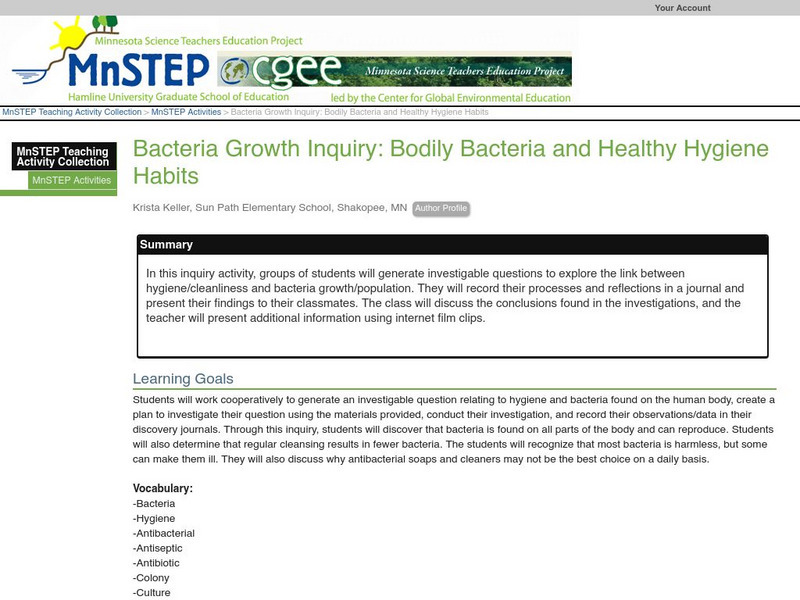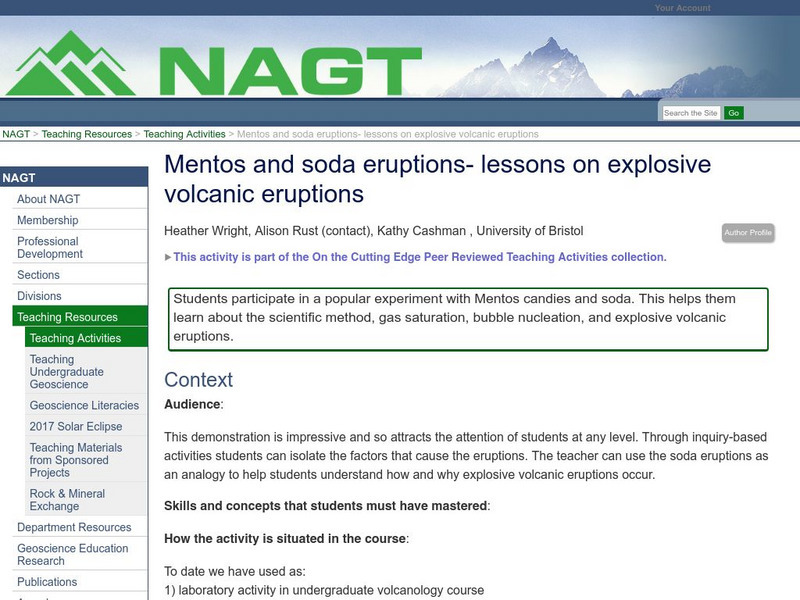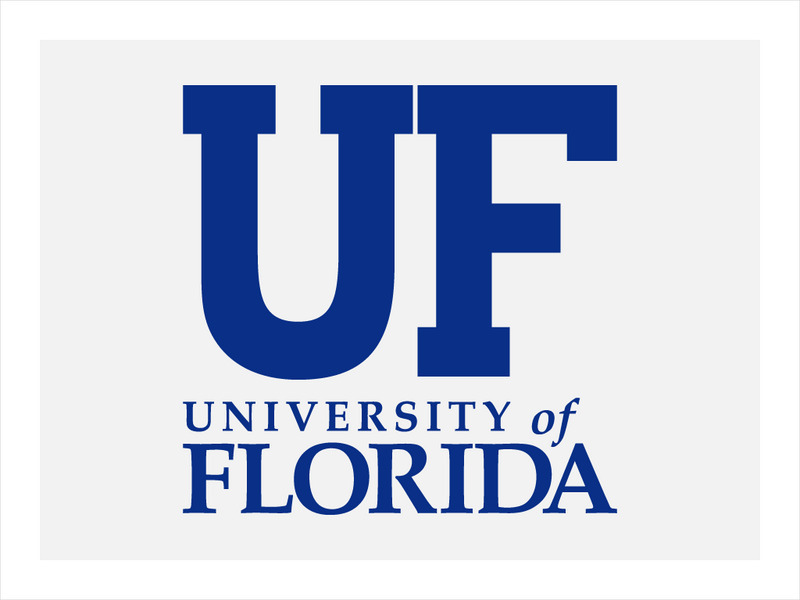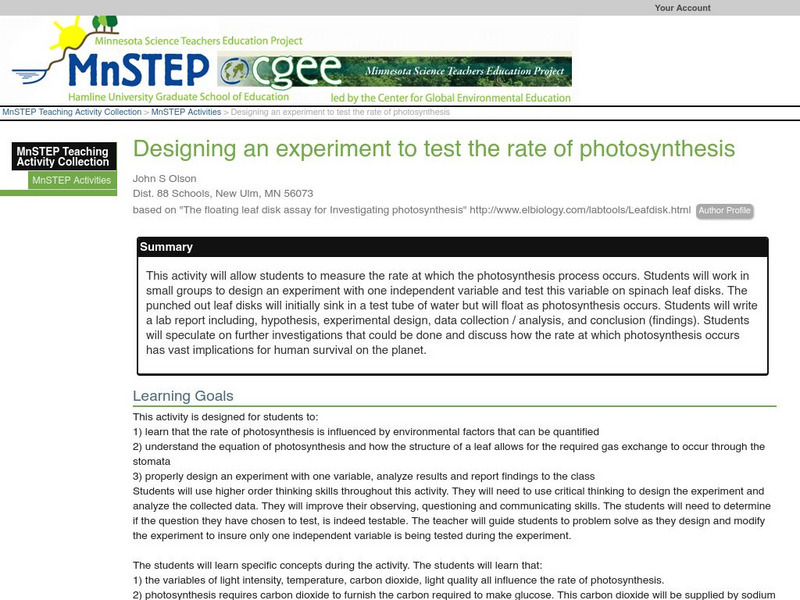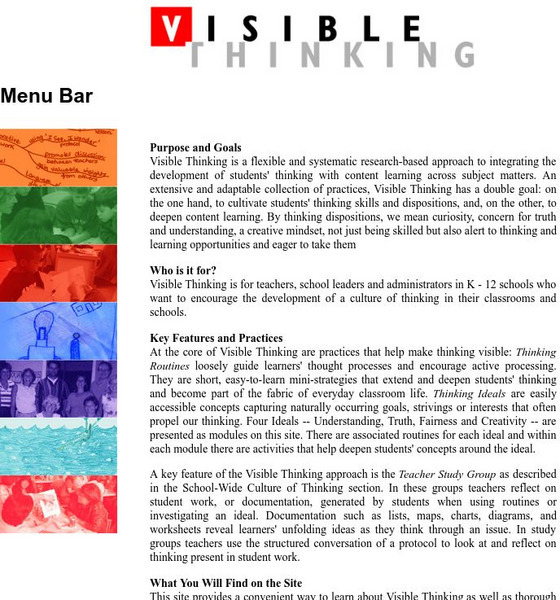Curated OER
The Importance of Water
Students explore the importance of water. They discuss why water is important and students design an experiment that evaluates the water quality and methods of improving water quality. Students perform testing and report their findings.
Curated OER
Plant Growth and Environment
Third graders bring to school various green plants and categorize them into plant leaves, stems, roots, and fruits. They answer the question, "How can you show there is starch in a plant?" and perform the iodine test and describe the...
Curated OER
Cloning and Related Issues
Eighth graders research information on cloning and the surrounding issues online. They analyze the issues surrounding cloning and present their point of view with supporting details in a Powerpoint presentation.
Curated OER
Geologist and Core Sampling
Third graders observe a cupcake and attempt to answer each question on the observation page. They write three sentences that explains how a geologist takes core samples of the earth's surface. Students make sketches and write...
Curated OER
Robot Turning Lab
Students design a robot that can turn 90 degrees. In this robotics lesson, students explain the applications of their invention. They present their design in class.
Curated OER
Australian Ecology and Bushfires
Eighth graders discuss the different types of ecosystem. In this earth science lesson, 8th graders explain the benefits and harm of fire. They research articles about bush fires or controlled burn instance and share it with the class.
Curated OER
Robot Labyrinth
Students design a flowchart for their robotic program. In this physics lesson, students construct a robot that can navigate certain obstacles. They present their program and robots in class.
Curated OER
Sensor Challenge
Students develop a pseudo code flowchart for their robotic program. In this physics lesson, students construct a robot that can navigate through certain obstacles. They test their robot and present them to class.
Curated OER
Robot Olympics
Students design a robot based on given requirements. In this technology lesson, student test whether their robots can perform certain tasks. They present and discuss their program design.
Stanford University
Stanford Encyclopedia of Philosophy: Scientific Discovery
Scientific discovery is the process or product of successful scientific inquiry. Objects of discovery can be things, events, processes, causes, and properties as well as theories and hypotheses and their features (their explanatory...
ClassFlow
Class Flow: Scientific Investigation
[Free Registration/Login Required] This flipchart explains the steps of scientific investigation. It is intended to help build understanding of the scientific investigation process by providing definitions, opportunities for student...
American Chemical Society
American Chemical Society: Inquiry in Action: Teach Science Well
Online textbook reviews fundamentals of chemistry and physical science via slideshow presentations, notes, and videos. Materials for classroom activities engage students in inquiry-based, hands-on investigations covering molecular...
American Chemical Society
American Chemical Society: Inquiry in Action: Teach Science Well
Online textbook reviews fundamentals of chemistry and physical science via slideshow presentations, notes, and videos. Materials for classroom activities engage students in inquiry-based, hands-on investigations covering molecular...
Other
American Coal Foundation: Lesson Plan: Coal Formation
In this four-part lesson plan, students will conduct a simulation of the coal formation process and will show the ability to do scientific inquiry. For the final project, they will use their findings they have recorded on their "Coal...
Alabama Learning Exchange
Alex: I'm So Crushed
In this activity, students will have an opportunity to solve a mystery. They will discover why a soda can collapses during a demonstration due to the effects of changes in temperature and atmospheric pressure. Students will gain further...
ReadWriteThink
Read Write Think: Digging Up Details on Worms: Using Science in an Inquiry Study
A lesson plan based on a study unit of earthworms, using the inquiry model to integrate scientific processes with literacy practices. Instruction plans, related resources, and standards are included.
University of California
Understanding Science: Newton's 2nd Law: Inquiry Approach Lesson
For this lesson, students develop their own scientific experiment to test Newton's hypothesis that the acceleration of an object depends on the net force acting upon it and its mass. After completing their designed experiment, students...
Science Education Resource Center at Carleton College
Serc: Bacteria Growth Inquiry: Bodily Bacteria and Healthy Hygiene Habits
For this inquiry activity, groups of students will generate investigable questions to explore the link between hygiene/cleanliness and bacteria growth/population. They will record their processes and reflections in a journal and present...
National Association of Geoscience Teachers
Serc: Mentos and Soda Eruptions: Lessons on Explosive Volcanic Eruptions
Students will learn about volcanic eruptions, the scientific method, gas saturation, and bubble nucleation by participating in a popular experiment with Mentos candies and soda.
Other
American Coal Foundation: Lesson Plan: Generating Electricity From Coal
This two-part lesson plan teaches students about the process of generating electricity from coal and helps them research and discover alternate ways for using coal to produce electricity.
University of Florida
Florida Museum of Natural History: Investigating Water
This guide engages children in the process of scientific inquiry using the context of a favorite early childhood pastime-water play.
Science Education Resource Center at Carleton College
Serc: Investigating an Inquiry Approach to Germination Growth in Plants
In this lab, students investigate the effects of a variable on the germination of a small plant. They will compare the growth of their variable to a control then write a lab report to report their findings.
Science Education Resource Center at Carleton College
Serc: Designing an Experiment to Test the Rate of Photosynthesis
Using spinach leaf disks, students measure the rate at which the photosynthesis process occurs. Students speculate on further investigations that could be done and discuss how the rate at which photosynthesis occurs has vast implications...
Other
Harvard University: Project Zero: Visible Thinking
Learn about the key elements and practices of visible thinking, a mode of inquiry that develops students' thinking skills by encouraging them to be active processors. Includes a lot of advice about the kinds of small changes that...


